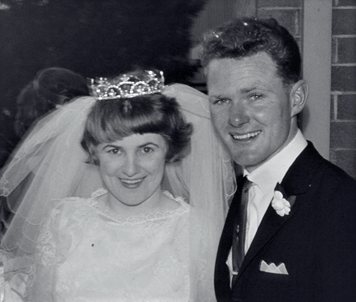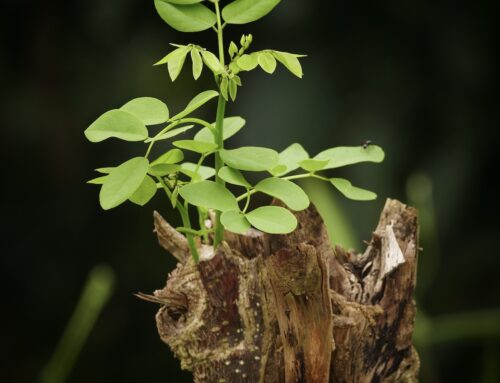What would you do, if you lost your long-term partner? How would you cope with the grief? My Armidale Teachers’ College classmate, Ian, writes about just this. Feel free to share your own experiences of loss in the comments, and we will get back to you.
Successes, disasters and catastrophes, good things, not so good and bad things, always seem to come in threes. My mum was a great believer in this. Why is it so? Scientists have examined the reason why bad things “come in threes”: Their conclusion is … that they simply don’t. Humans habitually look for patterns in random data in a way to extract order from disorder. Another important component is the affinity of the number three in Western culture: there’s multiple examples of this in religion (the Holy Trinity), storytelling (“The Three Pigs”, “Goldilocks and the Three Bears”), literature (the three-act play), and so on. Because of confirmation bias, and our own cultural biases, we just have a tendency to group things in threes.
Because of my mum and (apparently) my cultural bias I, too, believe in this phenomenon. As proof, I offer the fact that my life has been divided into three major sections: Before Wendy, With Wendy and After Wendy.
I first saw Wendy, the one who was to become my wife, when I went to Rollie O’Neill’s milk bar and fruit shop in Dungog in late 1963. I was playing cricket with the village team, Underbank, a team formed of men from the Chichester dairy farming community where I taught in my first school. After cricket the team went en masse to a Dungog pub for refreshments, but their ideas and consumption levels were both at variance to, and far greater than, mine; so I soon chose the milk bar for my post game refreshments. I chose that one, out of the half dozen milk bars in town, because Joy, a young lady from the same community, worked at O’Neill’s. Coincidentally, also working behind that counter was a vivacious young fair headed woman who caught my eye.
Before I met Wendy, I was something of a loose cannon, a tear away; a motorcycle nut who loved climbing hills, shooting rabbits and game for anything adventurous. Normally shy, when under the influence of alcohol I thought I was bullet proof, hilarious and a good catch for any girl. (There’s another reason to limit my alcohol consumption). When I got the courage up to shyly ask Wendy out, she flatly refused. I was determined and asked frequently … each Saturday after cricket … while she was equally firm in refusing each request. Finally her workmate Joy took pity on me and suggested she and her just married husband could double date with us. Wendy reluctantly agreed. The four of us went out each weekend in early 1964 until Wendy became comfortable enough to go out with me alone. Never-the-less we still had many double dates with Joy and her husband Colin.
On Wendy’s nineteenth birthday in 1965 we became engaged and married in the August/September school holidays in 1966. For the next five decades she went with me from school posting to school posting, from one rental home or school residence to the next, till we bought our life time home in Gorokan in 1980 and retired years later. We lived very happily together, raised three boys and a girl and later enjoyed the arrival of two grandchildren, a boy and a girl. Wendy confessed to me many years after we married that, because she was still only seventeen when I first asked her out, and had never had a boyfriend, and because I had already turned twenty, she thought I was too old and too experienced for her. Thank God for Joy’s intervention.
Then in December 2017 after fifty one years of marriage Wendy fell ill, was placed in an induced coma and five days later her children and I had to make the hugely disturbing and almost impossible decision to turn off the life support machinery and let her pass away. How can one make such a decision? I don’t know, but we did, however reluctantly.
Life after Wendy has been a huge struggle and a long road of self-re-education. How does one “get over” such a tragedy? The answer is that one doesn’t, one slowly adjusts, slowly accepts the inevitable and slowly changes their life focus by leaning on family and friends for support along the way. One forms new life patterns, redirecting one’s energy and direction to new and different things while being boosted by the memories of past glories.
Life goes in circles or cycles I have found, and often in threes. Happiness depends on our ability to be SELECTIVE, to be POSITIVE and to CONTINUE JOURNEYING along life’s path, anticipating better days ahead (there’s another three). I have decided to sit back more and to enjoy the natural world around us and be content to just BE! I want to save my time to use it selfishly, though still to be open to the needs of family and friends. I’ll allow my inner wonder to shine through, to be open to the simple things of nature, to nurture my curiosity. I want to have more time for BEING so I can still be DOING … things of my choice.
- Chichester is a small New South Wales Rural Location within the local government area of Dungog, it is located approximately 190kms from the capital Sydney covering an area of 218.353 square kilometres. Chichester has a recorded population of 29 residents and is within the Australian Eastern Daylight Time zone Australia/Sydney.







Thanks once again, Anne, for the opportunity to have a guest post ‘exposed’ on your site. I write for my own pleasure (and as a way to fill my time during lockdowns) and for the edification of my children and grandchildren so they may know in the future some of my inner feelings and experiences. If others can come across, read and enjoy my jottings, then that is a bonus.
The act of creating a written article, which then can be appreciated for its uniqueness, is to me just as important as the final outcome. It satisfies me to see my scribbling in print or on a screen. It is enough. It is my pleasure, my hobby and my therapy.
Right on, write on … relish and celebrate.
My mistake, Ian. I’ve just approved your comment. That’s all that was needed for it to show at the bottom of the post.
It’s my pleasure, Ian. You have much to teach us, from your great well of knowledge and wisdom.
It’s a lovely tribute to your late wife, Ian. Thanks for sharing you story.
Thanks once again, Anne, for the opportunity to have a guest post ‘exposed’ on your site. I write for my own pleasure (and as a way to fill my time during lockdowns) and for the edification of my children and grandchildren so they may know in the future some of my inner feelings and experiences. If others can come across, read and enjoy my jottings, then that is a bonus.
The act of creating a written article, which then can be appreciated for its uniqueness, is to me just as important as the final outcome. It satisfies me to see my scribbling in print or on a screen. It is enough. It is my pleasure, my hobby and my therapy.
Right on, write on … relish and celebrate.
Ian, I placed the header photo at the bottom of the post. If you’d like a black-and-white period wedding photo to put at the top, let me know. It doesn’t have to be yours and Wendy’s, but it can be. As long as the pixels are quite large.
That’s a lovely photo, Ian. You are both so young and happy, starting out on your life together.
Thanks for adding the photo header, Anne. It was taken fifty five years ago last August, 27th August 1966 to be precise. It seems like just yesterday in some respects, but oh-so-long-ago in others. Not every couple is lucky enough to have over fifty years of marriage.
Yes, it was obviously meant to be. I’ll put a link on Facebook, if that’s alright? It’s a great story.